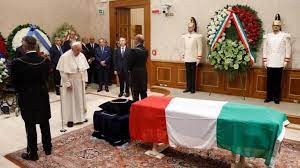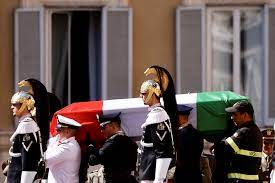Italy: Napolitano laid to rest in first secular funeral for president

Rome: Italy held its first non-religious funeral for a head of state on Tuesday with a secular service in parliament for Giorgio Napolitano, a two-time president who died last week aged 98.

Napolitano was the first former communist to become president and the first person to be elected twice to the post, which he held from 2006 to 2015.
“He fought good battles and supported wrong causes, trying, little by little, to correct mistakes and explore new paths,” his son Giulio told dignitaries, including Italian Prime Minister Giorgia Meloni, French President Emmanuel Macron and German President Frank Walter Steinmeier.

At least eight former Italian prime ministers were also present.
“He couldn’t stand demagogy, the spirit of faction, the reduction of political debate to shouting and invective,” Giulio Napolitano said.
Italian presidents are mostly ceremonial figures, but admirers credit Napolitano with having saved the country from financial ruin in 2011 when he persuaded the then-prime minister Silvio Berlusconi to resign during a debt crisis, opening the way for a technocratic government that placated the markets.

Critics accused him of orchestrating a coup d’etat. Berlusconi died in June, but one of his closest advisers, Gianni Letta, told mourners he hoped the two men would make up their differences in heaven.
“I like to imagine that when they meet up there, they can say to each other what they didn’t say down here, and, with every controversy settled, they can clear things up and reunite in the light,” Letta said in a brief speech.
Napolitano will be buried in Rome’s small non-Catholic cemetery, the final resting place of British poets John Keats and Percy Bysshe Shelley as well as Antonio Gramsci, a founding father of European Communism.

Although he was not religious, Napolitano was widely appreciated within the Roman Catholic Church and Pope Francis surprised his family by paying his respects in person during the lying-in-state in parliament at the weekend.
“A thought and a gesture of gratitude to a great man, servant of the nation,” the pope wrote in the book of condolences.





